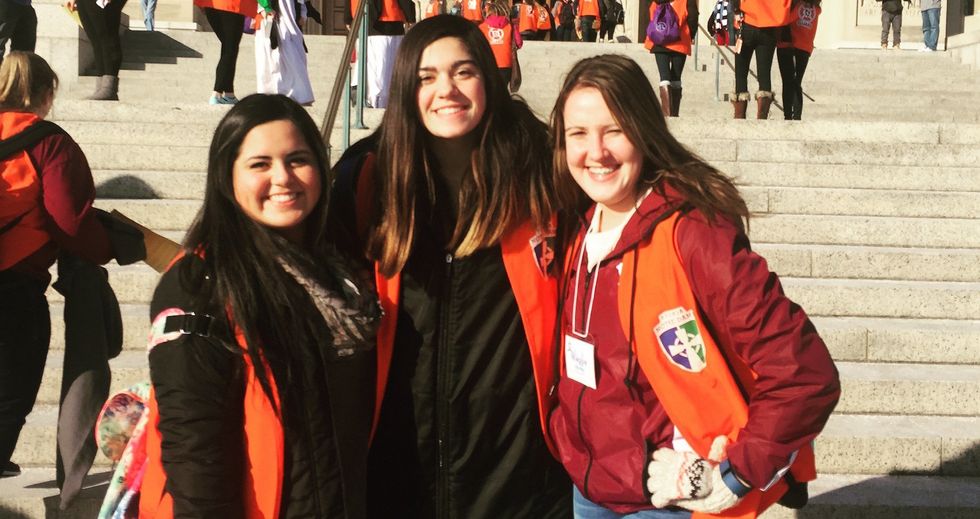As a 20-something-year-old woman at a liberal arts college, I often find myself on the not-so-popular end of pro-choice or pro-life debates.
And, if I'm being completely honest, I generally try to avoid those debates altogether. But some of my fellow students, three buses of students from my old high school (including my little sister), and millions of people from across the country marched in Washington D.C. and all over the country in support of the pro-life movement.
While I went twice in high school and found it to be one of the most formative experiences of my life (it definitely made the way into a few of my college admittance essays), I wasn't able to attend the march this year. But in solidarity with my friends and family, I want them to know that they are not alone in their fight for life.
Growing up in 13 years of Catholic schooling, I never got to hear the opposing side of the pro-life debate.
Sure, I knew what pro-choice was, but in all honesty, it was a kind of vague, somewhat demonized stance that I didn't understand. Major talk in devils-advocate scenarios were always the extreme cases that people make for abortion like incest or rape, not real-life (common) critiques that would be valuable to learn to talk about.
Coming to college (a liberal arts, non-religious college) definitely made me grow up pretty quick and realize that, at least it would seem like I was the minority opinion, not the majority.
And as anyone who has led a sheltered life to be confronted with the world can attest: it was not a comfortable place to be.
In my first year of college, I was faced with a decision. I, after 13 years of school and four years in a pro-life club, could slowly remove myself from the debate and remain quietly pro-life or I could change my opinion to be popular with my peers. While I am proud to say that I didn't conform to the latter, I'm not necessarily proud to say that I did the former either.
During my freshman year, I joined Butler's pro-life club, Bulldogs for Life.
It was a small club, with inconsistent meeting times, and only about 10 members at each meeting. I, reluctantly, admit that in that year I probably only went to about five meetings and didn't go to almost any of the "engagement" activities. I was scared.
There was such a stigma about being pro-life that I didn't even know existed.
It went from quickly from an argument and stance that I made primarily through religion, to almost not being able to utilize these lines of argument because the people I was dialoguing with didn't even adhere to the same religion as me. It wasn't until my junior year that I felt really comfortable talking to my peers about my beliefs.
I've always been taught and raised to believe that I could do and be anything I wanted to be, regardless of my gender.
But now, I'm told that if I didn't believe in a woman's right to choose to murder her own child before it was born, I was against ALL women's rights.
People where implicitly arguing that I didn't believe that women had the right to control their own lives. I believe that a woman doesn't have the right to choose whether a child lives or dies. We would be horrified if a woman killed her infant baby a few months after birth, but people go on Women's Marches lobbying for the right to do the same a few months before the birth.
Moving from a part of the body to the outside world doesn't make someone human, and that's basically, in a crude nutshell, what the difference is between a baby being in the womb and not. I know that there are plenty of lines of debate about what actually makes someone human.
This is not a debate that I could fully explain in an article to satisfy anyone. What I can do is say I FIRMLY believe that a child is a child from the moment it is conceived by its parents, and that baby should have the right to live the same to any other human being like you and me right now.
I don't expect to change the world with this article. I don't even expect that many people to agree with me.
But please know, all of you high school students who went on the March for Life: it WILL get harder.
When you graduate and move on to college, you will be faced with a choice to stand up and stick to what you believe or to quietly wait on the sidelines. You may feel pressured to not voice or even change your opinion. I hope that all of you know — and all the college students too — that there are people out there that believe that women can have it all, and ALL their children can, too.
























